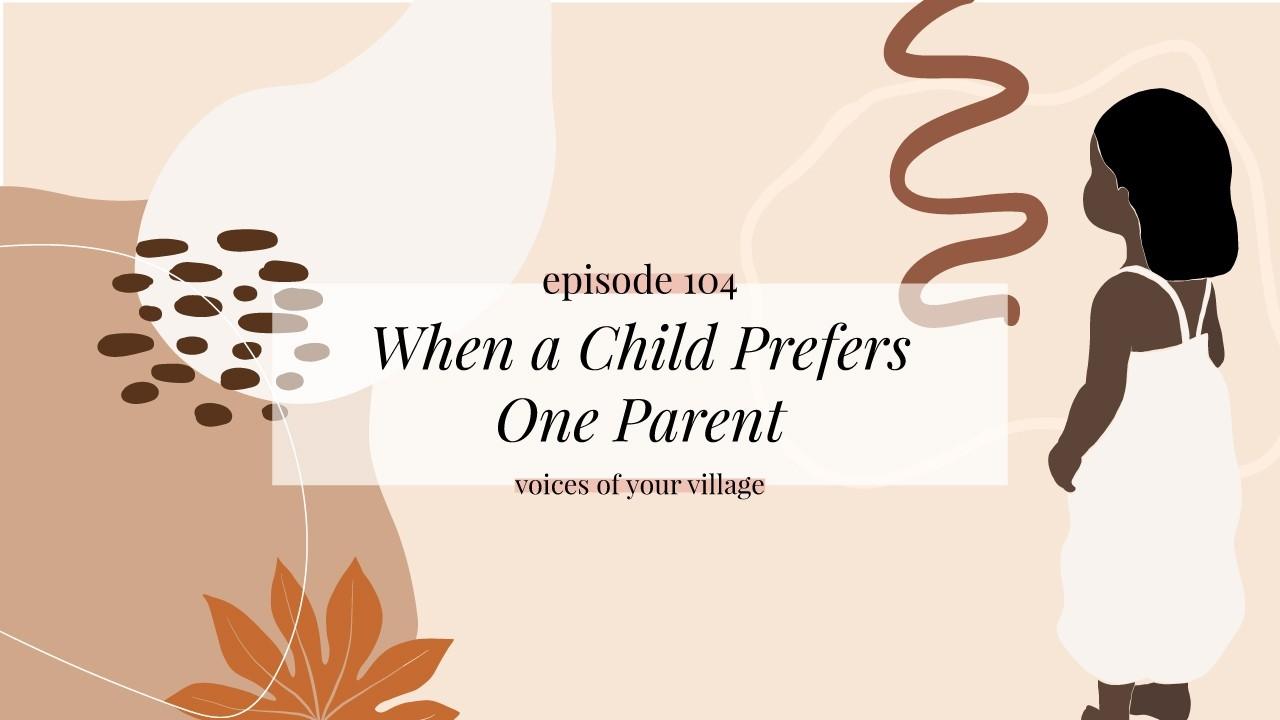When a Child Prefers One Parent

Howdy Villagers! And welcome to episode 104 of the Voices of your Village podcast. In today’s episode, I answer your questions and address your comments about one specific incident that arises in parenting: what does it look like when a child appears to favor one parent over the other.
There are adult feelings attached no matter which side you’re on.
When you are the parent who is the one your kiddo doesn’t want right now, there can be feelings of sadness and frustration. It can be lonely and disappointing, and you may feel left out when you are needed and desired by your kiddo for a long time at the beginning of their life to being no longer desired as they age into their preferences. First, we have to start by recognizing these emotions. It is crucial that neither you nor your co-parent is using phrases like, “it makes mommy sad when you don’t want me to put you to bed.” You can feel sad, frustrated, and all of these things but it is not your child’s job to be responsible for your emotions. It is your job to be mindful of how you are feeling and to have a toolbox to pull from to process these hard feelings.
If you are the parent who is wanted for all of the things right now, dang it is so exhausting and draining to feel like if you walk away your child will scream for you because they do not want their other parent in any capacity at the moment. It is totally understandable both to not want to have to do it yourself and to feel like it is easier to just do it yourself. As you’re navigating this it is important to not only bring awareness but tap into coping tools along the way. We all desire to have a healthy attachment with the humans around us. So, let’s take a moment to break down attachment.
So much of how we approach our attachments to our offspring stem from the attachments we’ve formed in early childhood.
There are four attachment styles, 1) Secure- A secure attachment is confident and reciprocated, it’s not reactive but responsive. Often in a secure attachment, there isn’t anxiety, you know the partner can handle your hard stuff and their own, and they are a calming presence for you. 2) Anxious and preoccupied- This is often where we see a lack of nurturing which leads to a lack of dependence on others. If you often felt that the main caretaker in your life was preoccupied you will tend to have lower self-esteem. 3) Dismissive avoidant- When people don’t believe that they need other people. These people are often emotionally distant and it can be hard for them to let down their walls and form intimate human connections. 4) Avoidant fearful- also known as high anxiety. These folks are often more dependent in relationships than others because they have a strong fear of rejection and desire a closeness that they are afraid of.
When we rush to make kiddos stop expressing their hard feelings, we are failing to form a secure attachment with them.
Ultimately what this all comes down to- when our child favors one parent over the other- is setting and holding boundaries. When we hold a boundary we are letting our kiddos know that it is our job to support their health, growth, and development. Often when we look at growth and development we have this idea that we aren’t allowed to hold these boundaries with our kids. There are going to be decisions that we make for them because we have more lived experience, in the same way, that I wouldn’t tell a kid, “You don’t have to change out of your poopy diaper if you don’t want to.” It is my job for their health to change them out of their diaper, even if they don’t want to.
We have this idea that in order to be respectful of our kids they have to be happy about our boundaries all the time, and that’s just not true.
As you move forward, get on the same page with your partner. Tap into your own self-awareness, what is your attachment style, and what do you want to establish with your child and partnership now? You can show up for this kiddo in a different way than you were shown up for in your childhood. This is never going to be perfect, but we never strive for perfection, but rather progress and intention.
